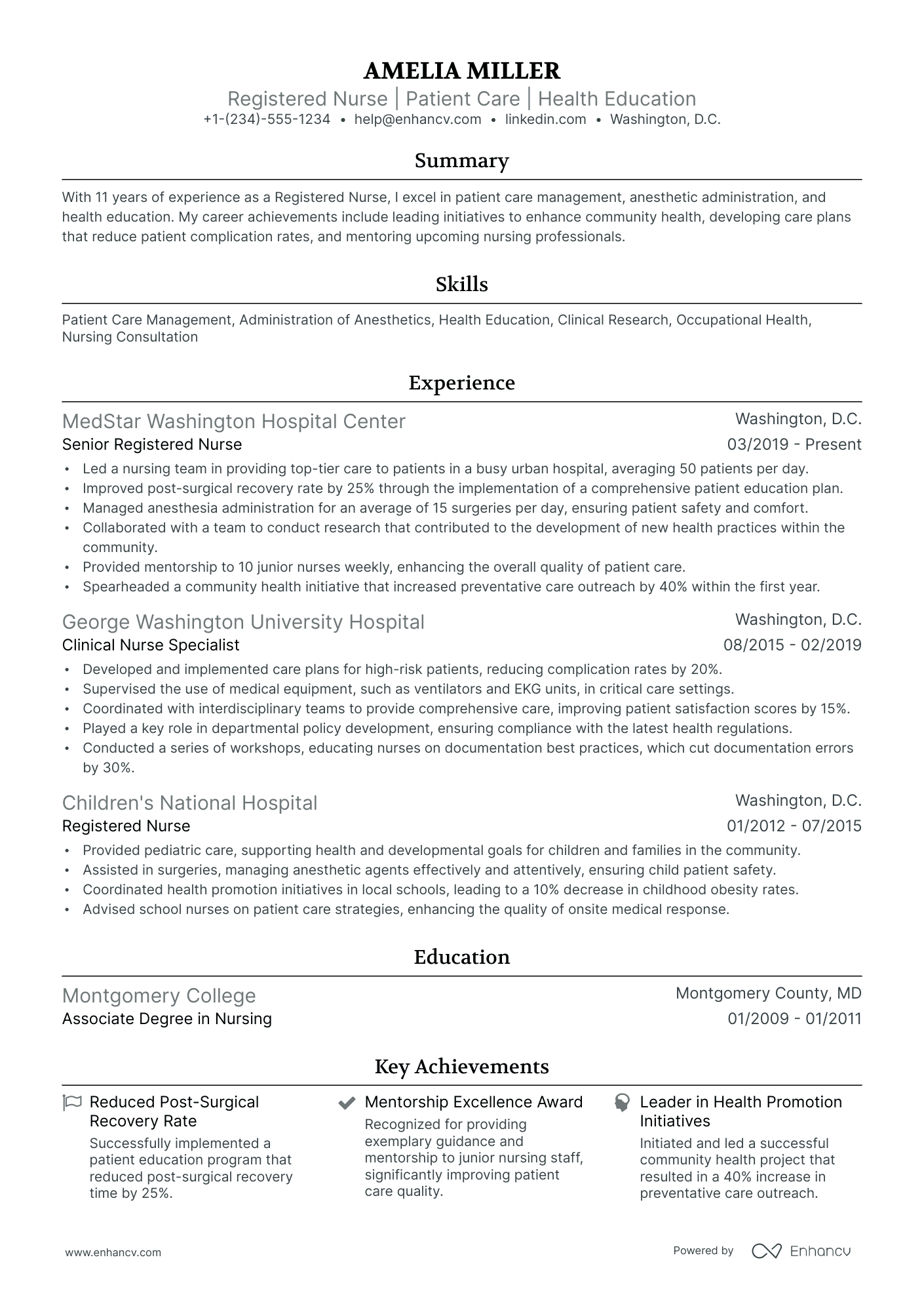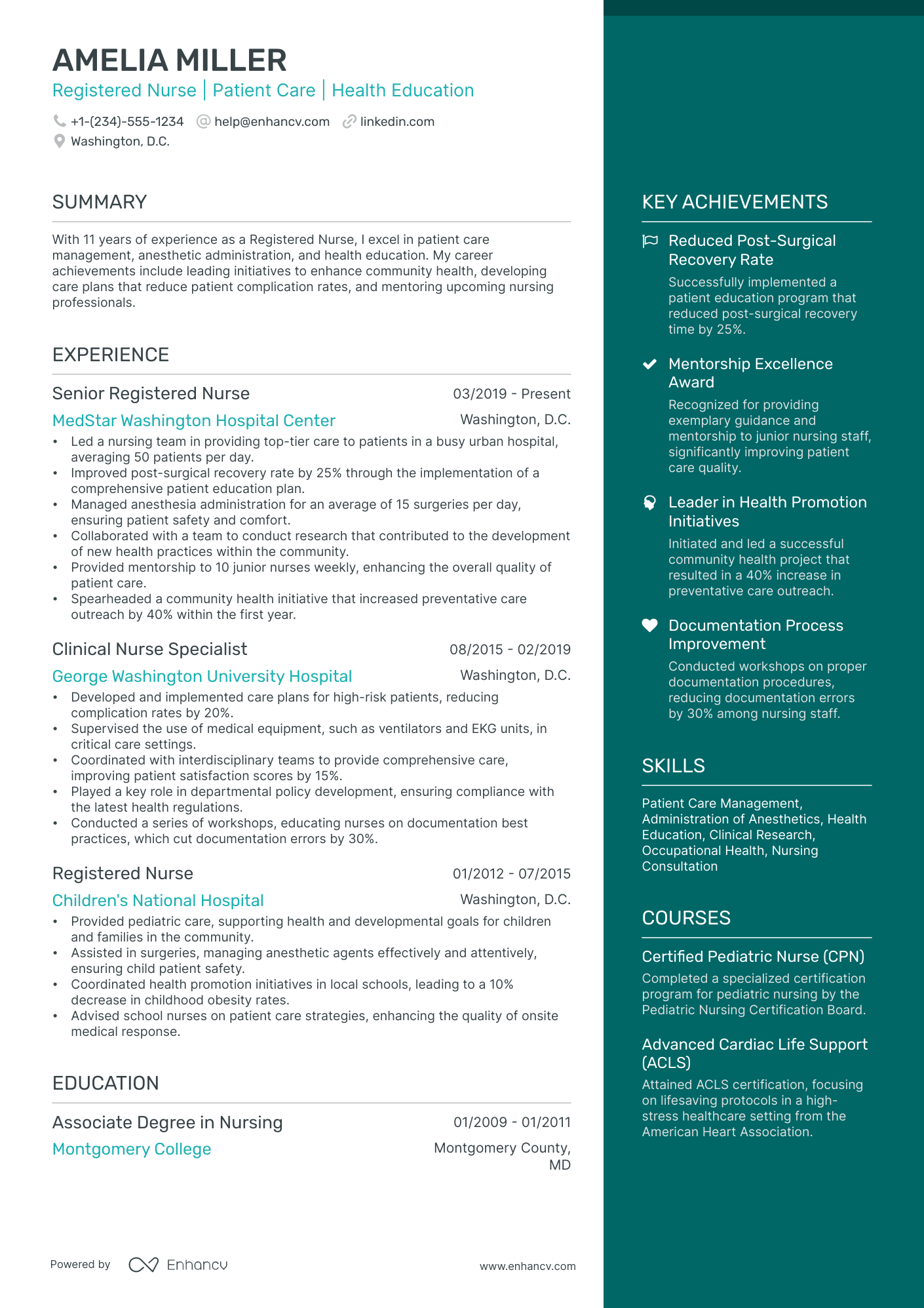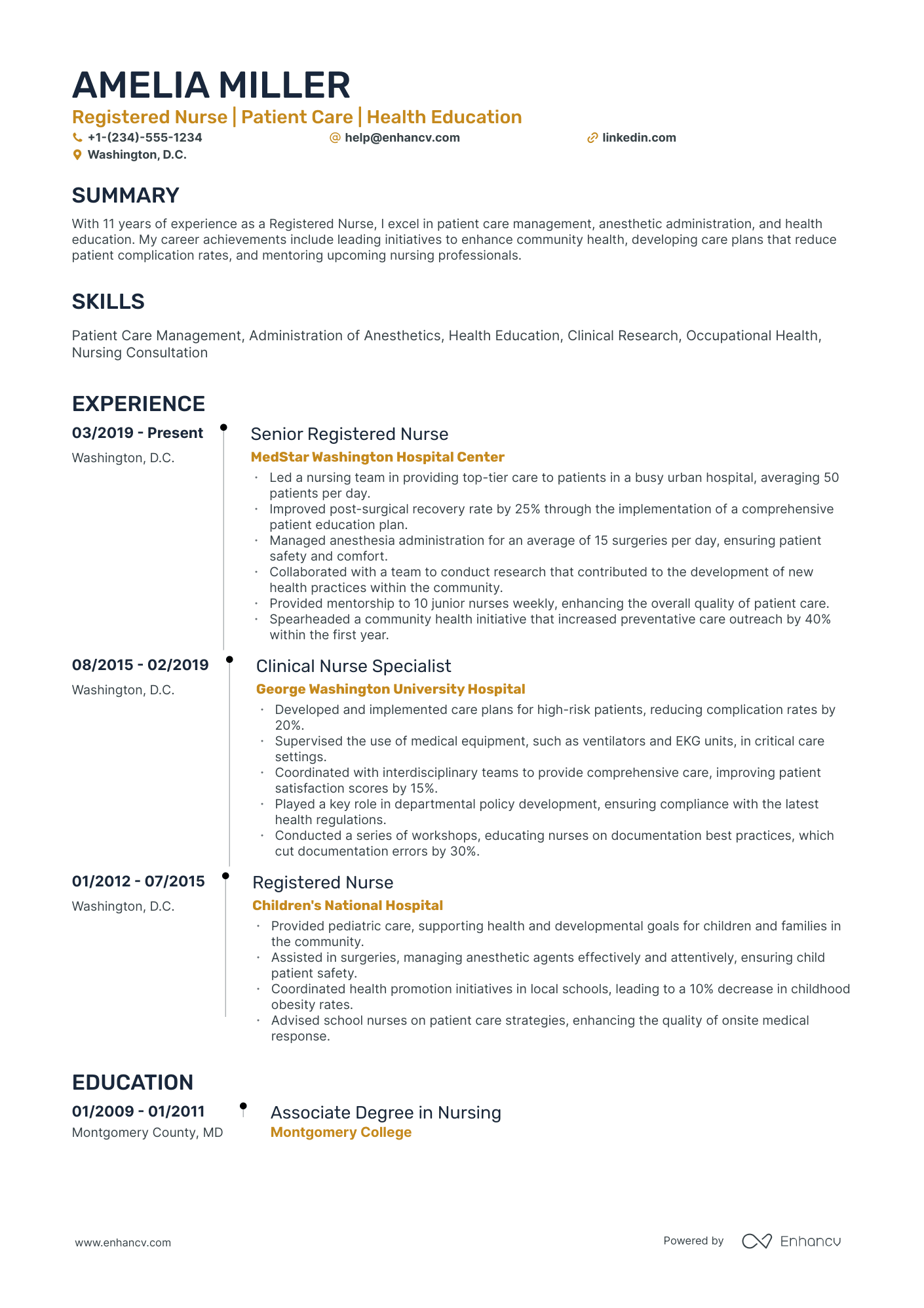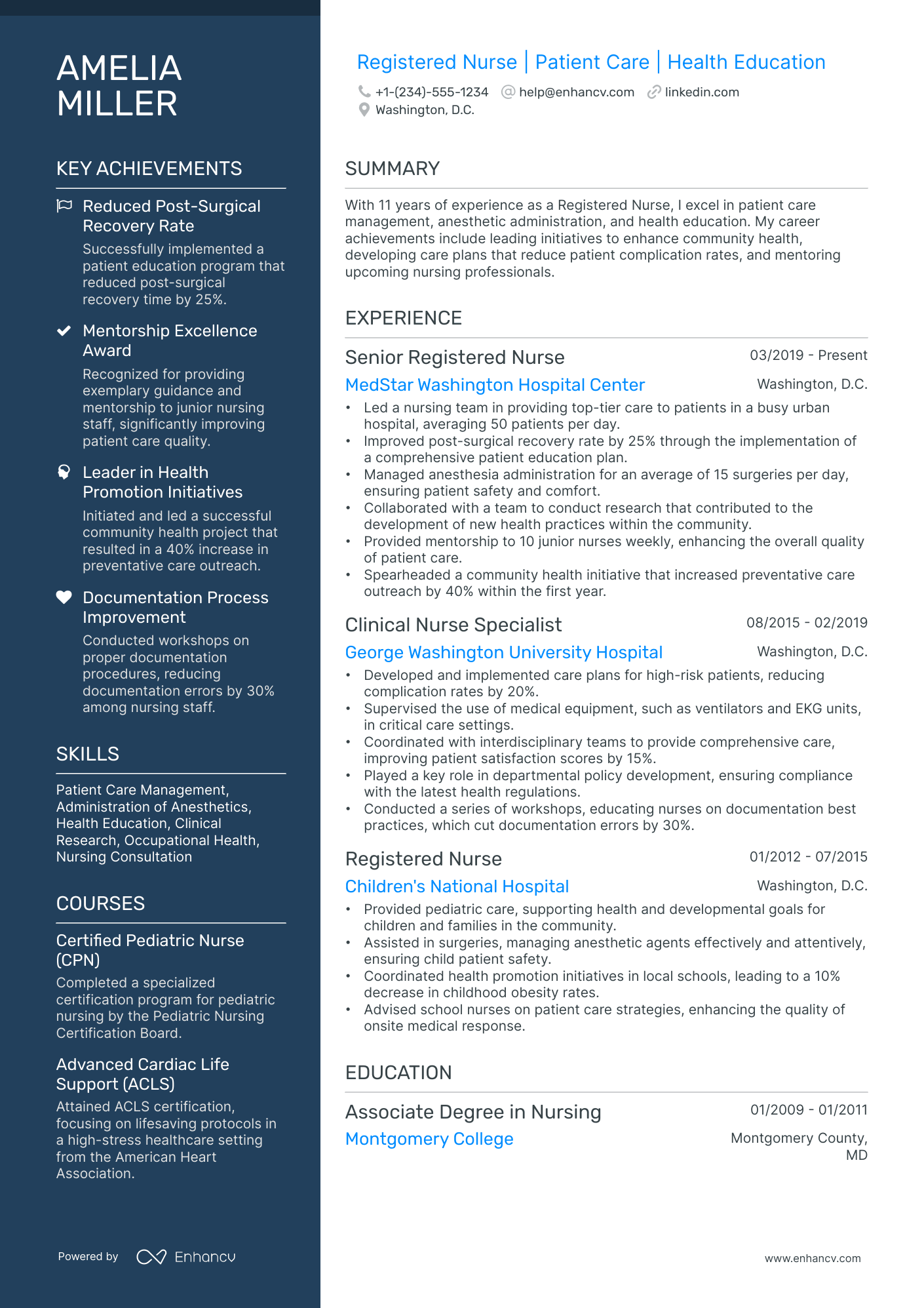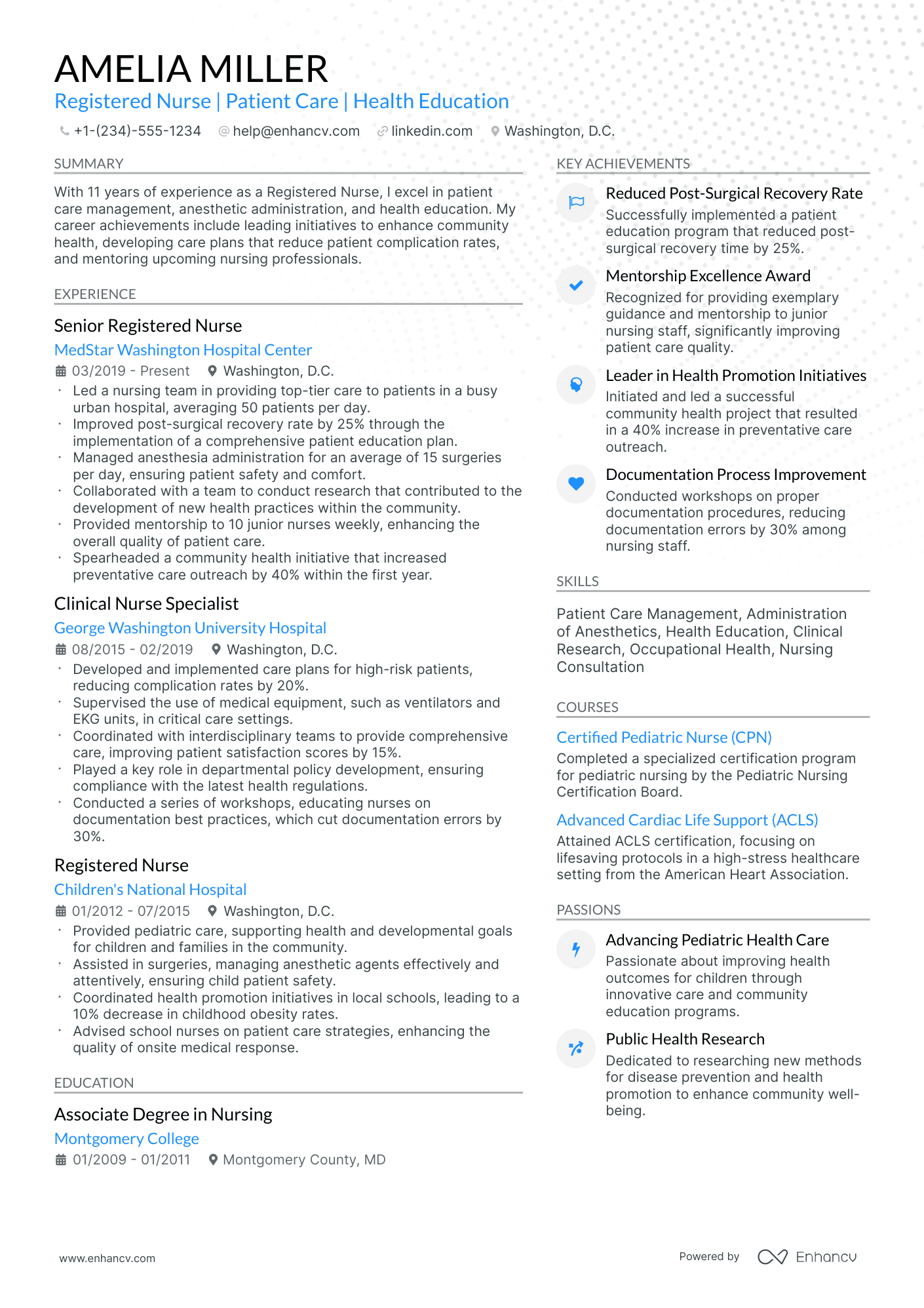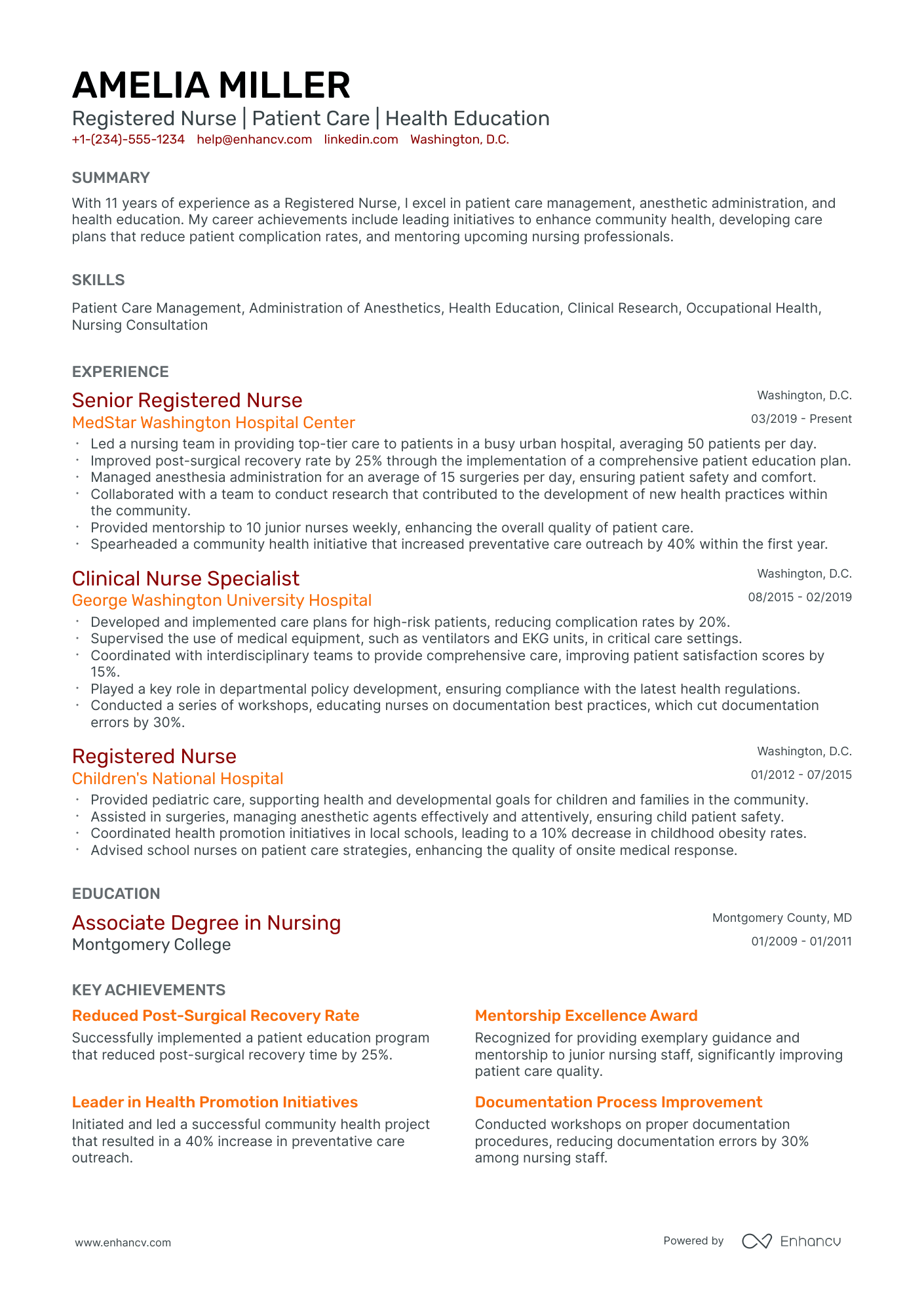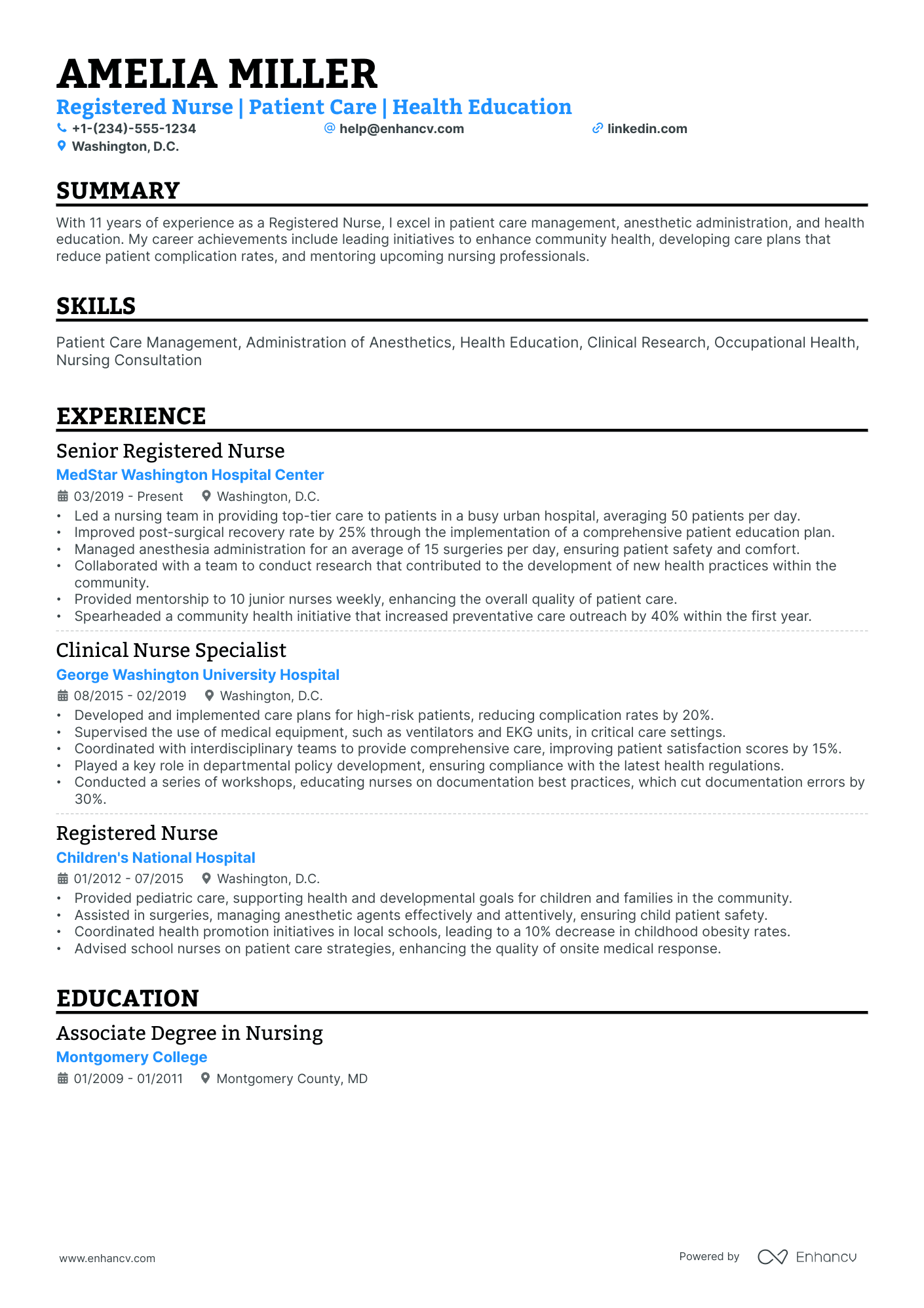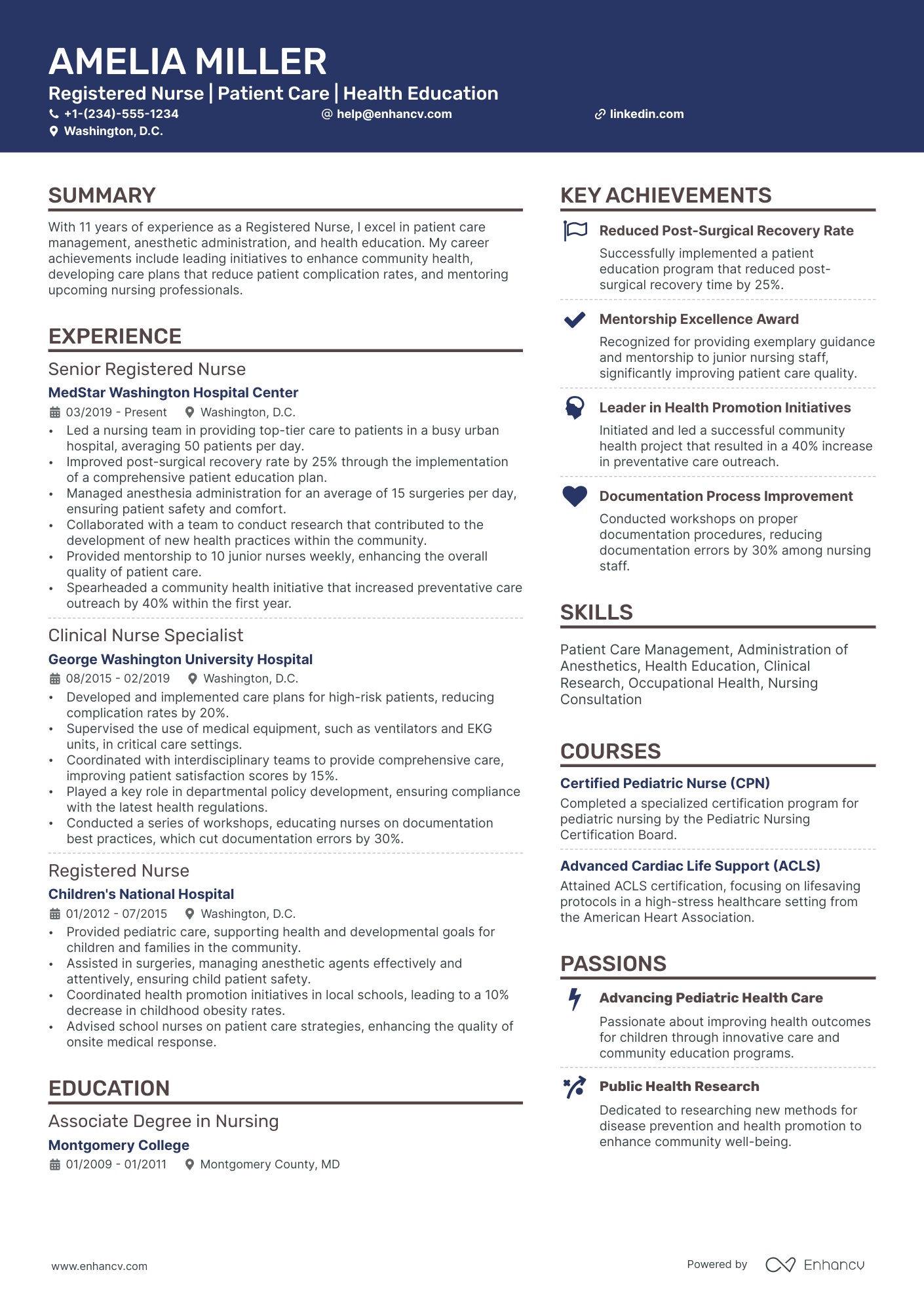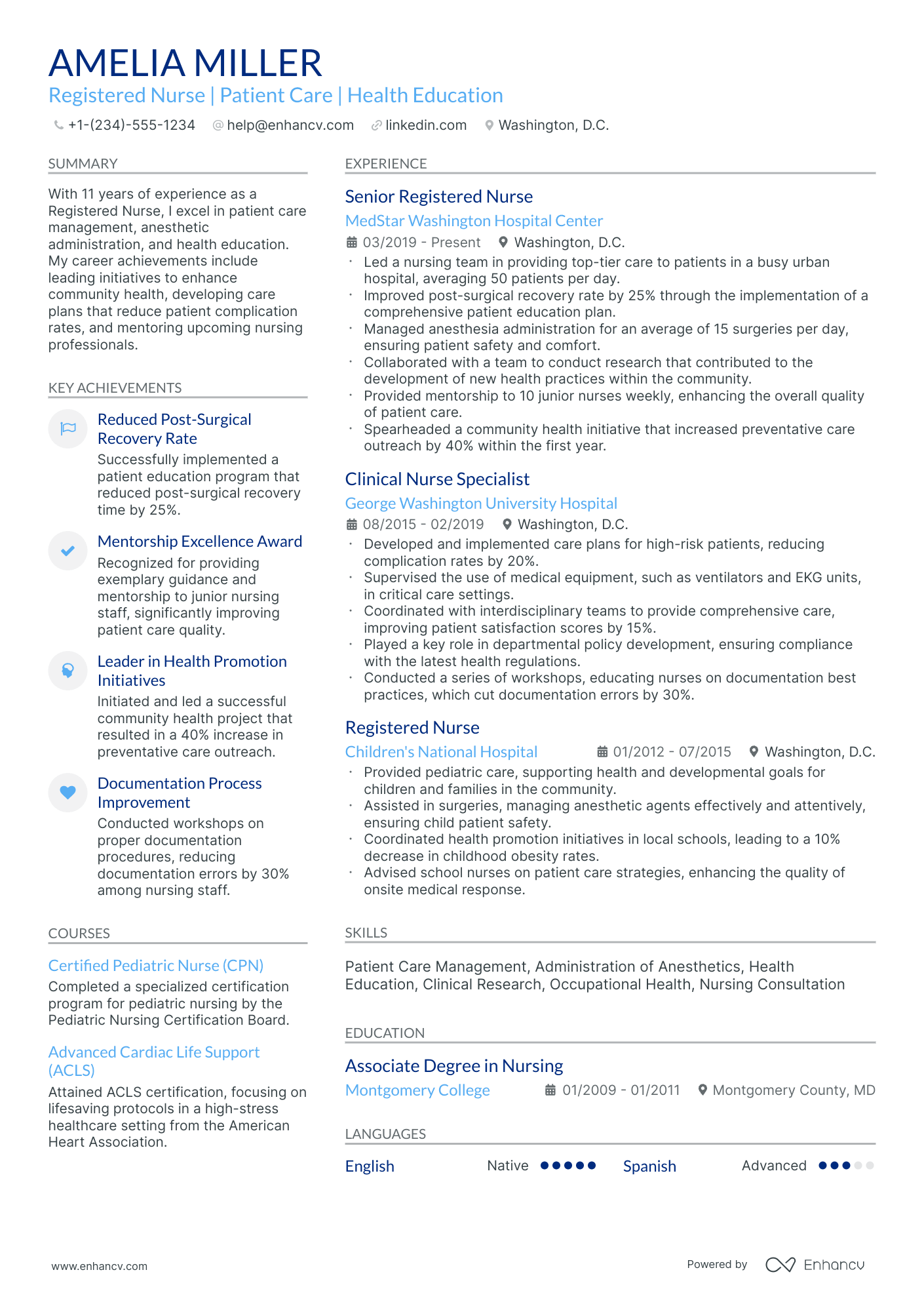As a clinical nurse, articulating the breadth of your specialized experience and patient care skills in a concise resume can be a daunting challenge. Our guide offers targeted advice and examples to help you effectively showcase your qualifications and stand out in a competitive healthcare job market.
- The most straightforward and effective resume format, ensuring your clinical nurse resume stands out among numerous candidate profiles;
- The significance of the top one-third of your resume, including the header, summary or objective, and skills section, and its impact on recruiters;
- Frameworks and structures used by real clinical nurse professionals, offering insights on how to enhance your resume with industry-specific expertise;
- A variety of clinical nurse resume sections that bolster your profile, showcasing your comprehensive capabilities and distinctiveness.
Gaining insights from the best has never been easier. Explore more clinical nurse resume examples below:
Clinical nurse resume format made simple
You don't need to go over the top when it comes to creativity in your clinical nurse resume format .
What recruiters care about more is the legibility of your clinical nurse resume, alongside the relevancy of your application to the role.
That's why we're presenting you with four simple steps that could help your professional presentation check all the right boxes:
- The reverse-chronological resume format is the one for you, if you happen to have plenty of relevant (and recent) professional experience you'd like to showcase. This format follows a pretty succinct logic and puts the focus on your experience.
- Keep your header simple with your contact details; a headline that details the role you're applying for or your current job; and a link to your portfolio.
- Ensure your resume reaches an up-to-two-page limit, only if you happen to be applying for a more senior role or you have over a decade of relevant experience.
- Save your clinical nurse resume as a PDF to retain its structure and presentation.
Tailor your resume format to the job market – a Canadian resume, for example, might differ in layout.
Upload & Check Your Resume
Drop your resume here or choose a file. PDF & DOCX only. Max 2MB file size.
PRO TIP
Mention specific courses or projects that are pertinent to the job you're applying for.
Clinical nurse resume sections to answer recruiters' checklists:
- Header to help recruiters quickly allocate your contact details and have a glimpse over your most recent portfolio of work
- Summary or objective to provide an overview of your career highlights, dreams, and goals
- Experience to align with job requirements and showcase your measurable impact and accomplishments
- Skills section/-s to pinpoint your full breadth of expertise and talents as a candidate for the clinical nurse role
- Education and certifications sections to potentially fill in any gaps in your experience and show your commitment to the industry
What recruiters want to see on your resume:
- Clinical Experience and Specializations: Areas of expertise such as ICU, ER, Pediatrics, Oncology, etc.
- Certifications and Licenses: Including specific credentials like BLS, ACLS, RN, or NP and their current status.
- Patient Care and Advocacy: Proven track record of providing exceptional patient care and evidence of patient advocacy.
- Technical Skills: Familiarity with clinical systems, electronic health records (EHR), and medical technologies.
- Soft Skills: Strong communication, teamwork, critical thinking, and adaptability in a fast-paced clinical environment.
What to include in the experience section of your clinical nurse resume
The resume experience section is perhaps the most important element in your application as it needs to showcase how your current profile matches the job.
While it may take some time to perfect your clinical nurse experience section, here are five tips to keep in mind when writing yours:
- Assess the advert to make a list of key requirements and look back on how each of your past jobs answers those;
- Don't just showcase you know a particular skill, instead, you need proof in the form of tangible results (e.g. numbers, percent, etc.);
- It's perfectly fine to leave off experience items that don't bring anything extra to your skill set or application;
- Recruiters want to understand what the particular value is of working with you, so instead of solely featuring technologies, think about including at least one bullet that's focused on your soft skills;
- Take care with wording each bullet to demonstrate what you've achieved, using a particular skill, and an action verb.
The below clinical nurse resume examples can help guide you to curate your professional experience, following industry-leading tips and advice.
- Implemented a new patient electronic records system, increasing the accuracy of medication administration records by 25%.
- Led a cross-functional team of nurses and physicians to reduce patient recovery time by developing comprehensive post-operative care plans.
- Coordinated the delivery of high-quality care for up to 20 patients daily in a fast-paced medical-surgical setting, ensuring adherence to the latest clinical guidelines.
- Devised and instituted a new patient triage protocol that decreased wait times by 35% in the emergency department.
- Actively participated in the research and implementation of a new wound care technique that reduced infection rates by 20% among post-surgical patients.
- Mentored and supervised a team of 10 newly graduated nurses, providing training to ensure high-quality patient care and compliance with hospital standards.
- Streamlined the chemotherapy administration process, resulting in a 15% increase in patient throughput for the oncology department.
- Created patient education materials that contributed to a 40% improvement in medication compliance rates among chronic disease populations.
- Collaborated with a multidisciplinary team to develop an innovative palliative care program that enhanced quality of life for terminally ill patients.
- Optimized the critical care unit's response to life-threatening situations by administering rapid assessments and interventions, effectively reducing patient mortality by 18%.
- Spearheaded the introduction of non-invasive monitoring technology which improved patient comfort and decreased the need for sedation by 25%.
- Conducted weekly interdisciplinary rounds with physicians, pharmacists, and social workers to create cohesive care plans that decreased patient hospital stays by an average of 3 days.
- Enhanced labor and delivery protocols, resulting in a 30% reduction in cesarean deliveries and a boost in maternal satisfaction.
- Implemented a department-wide initiative focused on breastfeeding education, which increased breastfeeding rates at discharge by 45%.
- Established a mentorship program for novice labor and delivery nurses, improving team competency and decreasing the time needed for independent practice.
- Developed a symptom management protocol for patients with chronic heart failure, reducing readmission rates by 22% over 6 months.
- Facilitated a series of professional workshops on cardiovascular health that enhanced the knowledge base of the nursing team by 40%.
- Pioneered a community outreach initiative that educated over 500 individuals on heart disease prevention, significantly improving the local community health index.
- Promoted evidence-based practice by integrating the latest research into clinical procedures, thus improving patient outcomes in the telemetry unit.
- Directed a successful accreditation process for the intensive care unit, achieving a 100% score on compliance with national standards.
- Orchestrated a seamless transition during hospital unit mergers by maintaining staffing levels and patient care without disruption.
- In response to the COVID-19 pandemic, quickly adapted to new protocols and provided education to staff, ensuring a safe environment for over 1,000 patients and employees.
- Championed the use of telehealth services in the clinic, expanding patient access by 150% and allowing for continued care during lockdown periods.
- Launched a quality improvement project aimed at reducing medication errors in the hospital, achieving a 20% decrease over the course of a year.
The following content includes information from "O*NET OnLine" by the U.S. Department of Labor, Employment and Training Administration (USDOL/ETA). Used under the CC BY 4.0 license. The data represents the top responsibilities present on the task lists for clinical nurse professionals.
Top Responsibilities for Clinical Nurse:
- Collaborate with other health care professionals and service providers to ensure optimal patient care.
- Develop and maintain departmental policies, procedures, objectives, or patient care standards, based on evidence-based practice guidelines or expert opinion.
- Develop nursing service philosophies, goals, policies, priorities, or procedures.
- Direct or supervise nursing care staff in the provision of patient therapy.
- Read current literature, talk with colleagues, or participate in professional organizations or conferences to keep abreast of developments in nursing.
- Instruct nursing staff in areas such as the assessment, development, implementation, and evaluation of disability, illness, management, technology, or resources.
- Provide coaching and mentoring to other caregivers to help facilitate their professional growth and development.
- Provide consultation to other health care providers in areas such as patient discharge, patient care, or clinical procedures.
- Develop, implement, or evaluate standards of nursing practice in specialty area, such as pediatrics, acute care, and geriatrics.
- Maintain departmental policies, procedures, objectives, or infection control standards.
Quantifying impact on your resume
- Include the number of patients you’ve managed per shift to demonstrate your ability to handle a high volume of work efficiently.
- Quantify the percentage of patient satisfaction improvement you contributed to through patient care initiatives.
- List the exact number of team members you’ve supervised or mentored, showing leadership and management capabilities.
- Specify the reductions in medication errors achieved under your supervision by indicating the percentage decrease.
- Document the number of clinical procedures or assessments you have performed to highlight your hands-on experience and proficiency.
- Mention the amount of cost savings realized through supply management or process improvements you've implemented.
- State the number of training sessions or workshops you have conducted to demonstrate your commitment to team development and education.
- Identify any increase in clinic efficiency or patient throughput in numbers to show the direct impact of your organizational skills.
Action verbs for your clinical nurse resume
Experience section for candidates with zero-to-none experience
While you may have less professional experience in the field, that doesn't mean you should leave this section of your resume empty or blank.
Consider these four strategies on how to substitute the lack of experience with:
- Volunteer roles - as part of the community, you've probably gained valuable people (and sometimes even technological capabilities) that could answer the job requirements
- Research projects - while in your university days, you may have been part of some cutting-edge project to benefit the field. Curate this within your experience section as a substitute for real-world experience
- Internships - while you may consider that that summer internship in New York was solely mandatory to your degree, make sure to include it as part of your experience, if it's relevant to the role
- Irrelevant previous jobs - instead of detailing the technologies you've learned, think about the transferable skills you've gained.
Recommended reads:
PRO TIP
Always remember that your clinical nurse certifications can be quantified across different resume sections, like your experience, summary, or objective. For example, you could include concise details within the expertise bullets of how the specific certificate has improved your on-the-job performance.
Popular clinical nurse hard skills and soft skills for your resume
Apart from assessing your professional expertise, recruiters are on the lookout for whether your skills align with the job.
Your profile would thus be assessed in regard to your:
- Hard or technical skills - your ability to perform on the job using particular technologies or software
- Soft skills - how you adapt, communicate, and thrive in different environments.
Both types of skills - hard and soft skills - are important for your resume, so make sure to create a dedicated skills section that:
- Lists up to five or six skills that align with the job advert.
- Integrates vital keywords for the industry, but also reflects on your personal strengths.
- Builds up further your skills with an achievements section within which you explain what you've achieved thanks to using the particular skill.
- Aims to always quantify in some way how you've used the skill, as it's not enough to just list it.
What are the most sought out hard and soft skills for clinical nurse roles?
Check out the industry's top choices with our two dedicated lists below:
Top skills for your clinical nurse resume:
Electronic Health Records (EHR) Management
Patient Care Technology
Medical Equipment Operation
Phlebotomy
Infusion Therapy
Wound Care Management
Cardiopulmonary Resuscitation (CPR)
Basic Life Support (BLS)
Advanced Cardiovascular Life Support (ACLS)
Clinical Assessment Skills
Communication
Empathy
Teamwork
Critical Thinking
Time Management
Problem-Solving
Adaptability
Attention to Detail
Emotional Resilience
Cultural Competence
Next, you will find information on the top technologies for clinical nurse professonals from "O*NET OnLine" by the U.S. Department of Labor, Employment and Training Administration (USDOL/ETA). Used under the CC BY 4.0 license.
Top technologies for Clinical Nurse’s resume:
- eClinicalWorks EHR software
- GE Healthcare Centricity EMR
- Microsoft PowerPoint
- Microsoft Excel
PRO TIP
Bold the names of educational institutions and certifying bodies for emphasis.
Discover the perfect certification and education to list on your clinical nurse resume
Value the insights your resume education section offers. It can shed light on various proficiencies and experiences tailored for the job.
- Add only college or university degrees, stating the institution and duration.
- If you're nearing the end of your degree, note your graduation date.
- Weigh the pros and cons of including unrelated degrees - it might not be your best choice with so little space on your resume.
- Talk about your educational achievements if they amplify your relevant experience.
There are so many certificates you can list on your resume.
Just which ones should make the cut?
- List your prominent higher education degree in a separate box, alongside the name of the institute you've obtained it from and your graduation dates
- Curate only relevant certificates that support your expertise, hard skills, and soft skills
- Certificates that are more niche (and rare) within the industry could be listed closer to the top. Also, this space could be dedicated to more recent certifications you've attained
- Add a description to your certificates or education, only if you deem this could further enhance your chances of showcasing your unique skill set
When listing your certificates, remember that it isn't a case of "the more, the merrier", but rather "the more applicable they are to the industry, the better".
Recruiters have hinted that these are some of the most in-demand certificates for clinical nurse roles across the industry:
The top 5 certifications for your clinical nurse resume:
- Basic Life Support (BLS) - American Heart Association
- Advanced Cardiovascular Life Support (ACLS) - American Heart Association
- Pediatric Advanced Life Support (PALS) - American Heart Association
- ONC Certified Nurse (OCN) - Oncology Nursing Certification Corporation
- Certified Emergency Nurse (CEN) - Board of Certification for Emergency Nursing
The content below includes information from "O*NET OnLine" by the U.S. Department of Labor, Employment and Training Administration (USDOL/ETA). Used under the CC BY 4.0 license. The data represents the top associations for clinical nurse professionals.
Top US associations for a Clinical Nurse professional
- National Association of Clinical Nurse Specialists
- American Association of Colleges of Nursing
- American Association of Critical-Care Nurses
- American Association of Diabetes Educators
- American Heart Association
PRO TIP
If you happen to have some basic certificates, don't invest too much of your clinical nurse resume real estate in them. Instead, list them within the skills section or as part of your relevant experience. This way you'd ensure you meet all job requirements while dedicating your certificates to only the most in-demand certification across the industry.
Recommended reads:
Adding a summary or objective to your clinical nurse resume
One of the most crucial elements of your professional presentation is your resume's top one-third. This most often includes:
- Either a resume summary - your career highlights at a glance. Select the summary if you have plenty of relevant experience (and achievements), you'd like recruiters to remember about your application.
- Or, a resume objective - to showcase your determination for growth. The perfect choice for candidates with less experience, who are looking to grow their career in the field.
If you want to go above and beyond with your clinical nurse resume summary or resume objective, make sure to answer precisely why recruiters need to hire you. What is the additional value you'd provide to the company or organization? Now here are examples from real-life clinical nurse professionals, whose resumes have helped them land their dream jobs:
Resume summaries for a clinical nurse job
- With over 8 years of dedicated experience in pediatric nursing at a top-ranked children's hospital, I possess a comprehensive skill set ranging from acute care to chronic disease management, coupled with a commendable track record in improving patient outcomes and leading successful vaccination initiatives.
- Seasoned clinical nurse with 10 years in oncology nursing, renowned for excellence in delivering compassionate care, optimizing treatment plans, and spearheading a hospital-wide project that increased patient adherence to chemotherapy protocols by 15%.
- Former paramedic with 5 years of emergency medical experience transitioning into clinical nursing, bringing a unique perspective and swift decision-making skills to high-stakes environments, along with a strong foundation in patient assessment and emergency care.
- An experienced educator and health policy advocate with a PhD in Public Health seeking to leverage a decade of experience into clinical nursing, offering robust research skills, comprehensive knowledge of healthcare systems, and a passion for evidence-based patient care practices.
- Eager to apply my newfound knowledge from an intensive Bachelor of Science in Nursing program and hands-on clinical practicums to deliver high-quality patient care, aspire to further develop my technical nursing skills, and aim to make a meaningful contribution to patient health and wellness.
- Recently certified Registered Nurse poised to translate a solid educational foundation, including a capstone project on infection control that was adopted by the nursing school, into practical application, motivated to build upon my clinical rotations in various healthcare settings.
Optimize your resume summary and objective for ATS
Drop your resume here or choose a file.
PDF & DOCX only. Max 2MB file size.
Average salary info by state in the US for clinical nurse professionals
Local salary info for Clinical Nurse.” Source: My Next Move, National Center for O*NET Development. Accessed 10/15/2024
| State | Average Salary (in USD) |
|---|---|
| US National Average | $86,070 |
| California (CA) | $133,990 |
| Texas (TX) | $85,110 |
| Florida (FL) | $80,960 |
| New York (NY) | $104,570 |
| Pennsylvania (PA) | $82,780 |
| Illinois (IL) | $82,470 |
| Ohio (OH) | $79,940 |
| Georgia (GA) | $83,620 |
| North Carolina (NC) | $79,580 |
| Michigan (MI) | $81,710 |
Beyond your clinical nurse resume basics - extra sections
Ensure your clinical nurse resume stands out from the crowd by spicing it up with a couple of supplementary sections that showcase your:
- Prizes - as a special nod to what matters most in the field;
- Projects - ones that would really further support your application;
- Hobbies - include only if you think they'd further your chances at landing the role with personality
- Community impact - to hint at the causes you care about.
Key takeaways
- Your clinical nurse resume is formatted professionally and creates an easy-to-read (and -understand) experience for recruiters;
- You have included all pertinent sections (header, summary/objective, experience, skills, certifications) within your clinical nurse resume;
- Instead of just listing your responsibilities, you've qualified them with skills and the results of your actions;
- Within your clinical nurse resume, you've taken the time to align specific job requirements with your unique expertise, showcasing the value you can provide as a professional;
- Technologies and personal skills are featured across different sections of your clinical nurse resume to achieve the perfect balance.
